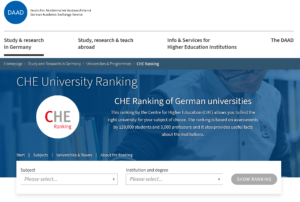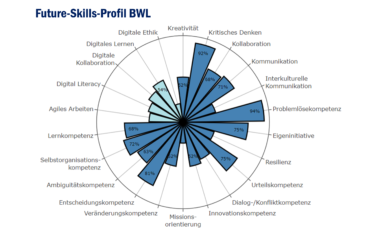More than 20,000 degree programmes are offered in Germany alone. And yet there is no such thing as a university that is best for everyone. Which criteria are important to me when it comes to studying? And which higher education institution (HEI) is the best choice for me with regard to my chosen subject? The CHE University Ranking provides orientation.
CHE Ranking
The most comprehensive and detailed ranking of German universities and universities of applied sciences
The CHE University Ranking contains facts on university study, teaching, equipment and research, as well as students’ opinions on study conditions at their HEI, and, for some subjects, how professors view the reputation of departments. In addition to comparative criteria, prospective students have a wealth of descriptive characteristics on academic programmes and teaching at their disposal. View the results at www.university-ranking.de.Methodology
The CHE University Ranking is based on methodological standards, setting it apart from other rankings in the German and English-speaking world in essential respects. Find out more about the methodologyAdvisory committees of the CHE University Ranking
The CHE University Ranking team is supported by a Coordinators’ Advisory Committee, a Subject Advisory Committee and a Scientific Advisory Board. Find out more about the advisory committeesTeam
Who to contact regarding the CHE University RankingHochschulrankingNews
Characteristics of the CHE University Ranking
The CHE University Ranking is created on the basis of a long-established methodology, which sets it apart from other rankings in the German and English-speaking world in four essential respects: it is strictly subject-related and multidimensional, and gives a picture of HEIs from different perspectives. Another distinguishing feature is that it displays ranking groups instead of ranking positions.
The CHE University Ranking is strictly subject-related. There is no comparison of entire HEIs on a level that goes beyond the subjects. This is based on the belief that there is no such thing as the “best higher education institution”. HEIs have specific profiles, featuring strengths and weaknesses in different subjects.
The CHE University Ranking is multidimensional. This means that, for a given subject, no overall value is derived from weighted individual indicators. HEIs have very individual strengths and weaknesses, even within a subject (such as with regard to course offerings, support and equipment). In addition, there is no empirical or theoretical basis on which to weigh individual indicators. We have to assume that decision preferences among the target group of first-year students are heterogeneous. A pre-determined weighting of indicators would contradict this.
The CHE University Ranking provides a picture of HEIs from different perspectives. In addition to facts about departments and degree programmes, the perspectives of lecturers and students are also incorporated into the ranking. This creates a more differentiated picture than that provided by rankings based only on surveying one particular group (such as students or staff managers only) and therefore allows for contrasts to be made between subjective assessments and objective indicators.
Rather than giving HEIs an individual ranking position, the CHE University Ranking assigns them to one of three ranking groups: a top group, a middle group or an end group. In doing so, a situation is avoided in which minor differences in the nominal value of an indicator are misinterpreted as differences in performance and quality.
Quality assurance in the CHE University Ranking
The CHE University Ranking was introduced in 1998. It meets the highest demands when it comes to transparency, methodology and reliability. This was also confirmed by the international ranking expert group IREG in 2014. Three advisory committees help ensure the continuous refinement and quality assurance of the CHE University Ranking.
The CHE University Ranking is published by the German weekly newspaper DIE ZEIT. CHE is fully responsible for the conceptual design of the ranking, data collection and analysis. The cooperation partner DIE ZEIT is responsible for publishing, distributing and marketing the ranking. All results can be accessed free of charge on the internet.
To find out more about quality assurance and data checks, refer to our detailed description of the methodology.





















